StateLogs: Wikileaks begins to reveal 250,000 diplomatic files
Wikileaks might be on the verge of releasing new information on a scale larger than before. We will provide the tools and context to explore the new logs.
When we published the Iraqi Warlogs, Wikileaks contacted us directly and we worked with them on the browsing interface that helped users analyze the 400,000 Sigacts from the US Army. This time, as Wikileaks might be on the verge of releasing new information on a scale larger than before, we decided not to be bound by a Non-disclosure Agreement, as last time, and to keep our hands untied. Together with Le Soir in Brussels and Slate.fr in Paris, we will provide the tools and context to explore the logs.
OWNI decided to name this project #StateLogs.
Below is our narration of the events as they unfold, augmented by the work of OWNI’s developers and partners.

We recommend to navigate through the full-screen version of our app

Retrouvez ici notre live-blogging en français.
All times given are CET (Paris), or GMT+1
We are now closing our live-blogging. You will find the most important elements on OWNIlive in the coming days (tagged “Wikileaks“).
Now, here are the points we will work on:
- Optimize and upgrade the application (géolocalization, timeline, implementation of the new cables)
- Analyze the documents already available and study the consequences of this leak
- Think of an adequate tool to study the forthcoming dumps
[3:00 p.m.] 100% of the documents released are available on the StateLogs app
At this time, 244 diplomatic telegrams were made public, either directly or by WikiLeaks media partners. All of these memos are now searchable and classifiable on statelogs.owni.fr
This represents 0.1% of the over 251,000 documents announced. All of them will be uploaded over the hours (and weeks!) on the application developed in partnership with Slate.fr and Lesoir.be. Our journalists, theirs, and all journalists wishing to work on these documents but also all citizens who wish to explore these rich documents can now do so.
Here’s the tag cloud generated by Opencalais with all the “leaks” of the diplomatic Cablegate.
[11:30 a.m.] Chavez calls for the resignation of Hillary Clinton
For the Venezuelan head of state, the United States has been “unmasked” and by the disclosure of diplomatic documents, and they must accept the consequences. Praising the “courage” of Wikileaks, Hugo Chavez called U.S. Secretary of State to “resign”, “the least she can do”, he said in a speech.
[12:00 p.m.] WikiLeaks’ next target? Banks
Andy Greenberg, a journalist for Forbes, publishes an exclusive interview of Julian Assange conducted on November 11 in London. We learn that half of the documents currently in possession of Wikileaks involve the private sector. It might contain exchanges between leaders of major U.S. banks. They “give an idea of how banks behave at the highest hierarchical level”, and could lead to reforms, according to WikiLeaks’ leader.
In this interview where the questions are often longer than the answers, Assange says his organization has a mass of documents too large to be transmitted in one dump. The choice was made to publish primarily the documents which “had the biggest impact,” which explains in part the focus on the U.S. Army. However, documents concerning the private sector “could bring down a bank or two …” and their publication is scheduled for early next year.
Besides, WikiLeaks appears to be in possession of documents about BP (but Assange says he wants to check their interest) and Russia (for which Assange evokes the pressures of the FSB, formerly KGB).
[7:30 p.m.] Hillary Clinton: “it is not a healthy debate”
In the first public statement since the release, Secretary of State states Hillary Clinton said the U.S “deeply regrets” the leak of diplomatic memos set up by Wikileaks, which is “not only an attack against the U.S., but the international community”, she added.
Hillary Clinton also affirmed Wikileaks has not harmed “partnerships and relathionships” established with other countries, which apparently say to the U.S: “don’t worry, you don’t know what we tell about you.”
[3:45 p.m.] Did The Guardian give cables to The New York Times ?
In a note to readers, The New York Times explains why it has chosen to publish the diplomatic memos updated by Wikileaks. More surprising, the newspaper highlights the fact that the documents were provided “by a source who insisted on anonymity.”
Still according to journalism.co.uk, the U.S newspaper would not have obtained the cables directly from Wikileaks. The Guardian journalist David Leigh told Yahoo News blog the Cutline his newspaper had supplied a copy of the memos to the NYT. Journalism.co.uk implies the critical treatment The Times sometimes gave to Wikileaks could be behind this blackout.
[3:30 p.m.] 7.500 memos on media relations?
According to Journalism.co.uk, more than 7.500 Statelogs tagged “OPRC” or “PR and Correspondance” could concern media relations. A large part of them would come from the U.S embassy in Turkey. Only two of this class have been published so far: “one is a round-up of Turkish media reaction and the other a summary of media reaction to news issues in China, the US and Iran”, says the website.
[2:30 p.m.]“Will Neslie Nielsen stop WikiLeaks?”
On Telex, one of the French newspaper Le Monde’s blogs, a cartoonist named tOad pays tribute to the late Leslie Nielsen, star of the Naked Gun movies.
[1:40 p.m.] 3 years to release everything?
WikiLeaks affirms all memos will be published during the next months on its Cablegate website:
The embassy cables will be released in stages over the next few months. The subject matter of these cables is of such importance, and the geographical spread so broad, that to do otherwise would not do this material justice.
The Belgian newspaper Le Soir gives its estimation:
Considering the volume of documents announced, with the publication of 230 memos per day, it would take 1092 days, as to say 3 whole years to publish the whole logs…
[12.20 pm.] A second WikiLeaks? Daniel Domscheit-Berg is lauching his own whistleblower tool reveals Guillaume Grallet, tech journalist at Le Point. This new website, very much alike Wikileaks, is due mid-december says Grallet. Domscheit-Berg used to be Wikileaks spokesperson before Assange fired him at the beginning of october.
[11.45 am.] Daniel Ellsberg on the notion of secrecy
Daniel Ellsberg, the man behind the Pentagon papers, gave a long interview to the web-radio Antiwar.com about the question of ethics in matters of secrecy. He points out that the laws do not condemn the leak of classified information and that a strong sense of morality is essential.
Clip audio : Le lecteur Adobe Flash (version 9 ou plus) est nécessaire pour la lecture de ce clip audio. Téléchargez la dernière version ici. Vous devez aussi avoir JavaScript activé dans votre navigateur.
[11.10 am.]a review of the Statelogs available
As of now, here is a list of the memos available on Wikileaks website and the five other newsrooms :
- 220 memos on WikiLeaks dedicated website
- 27 documents on the Guardian
- 18 Statelogs on the New York Times
- 17 cables on El Pais
- Not a single document was published on Le Monde
- We are in the process of putting the 200 Wikileaks documents into the Statelogs application. We downloaded from a torrent all the files in a .txt format with all the data (memos, dates, country of origin and classification)
In the meantime our colleagues at Le Soir.be have scheduled a chat at 11am with their senior journalist Alain Lallemand : “Wikileaks, a damp squib?”
Check out the video as soon as it is online
[9:00 a.m.] Chinese propaganda strikes back. According to Thenextweb.com, which quotes the Al-Jazeera correspondant in China, the propaganda department has passed a simple recommendation to media outlets: don’t report about WikiLeaks.
[8.30 a.m.] Australia wants to sue Julian Assange
Julian Assange’s country is determined to sue the founder of Wikileaks in court if the evidence is sufficient or if it appears that he violated the law. In a press conference, Attorney General Robert McClelland offers a helping hand to Washington:
The United States will be the lead government in that respect, but certainly Australian agencies will assist and we will look at – of course, I’d ask the Australian Federal Police to look at the issue as to whether any Australian laws have been breached as a specific issue as well.
So, these are serious matters; and we have formed a whole-of-government taskforce to look at the issues.
Asked by journalists on the topic, McClelland refused to mention if Assange’s passport will be withdrawn, stating he was waiting for “instructions from the agencies”.
[23:59 pm] Our app is being filled
Our developpers keep inserting the first StateLogs in our application, and the process is meant to continue in the coming week. For now, 27 cables are available, waiting to be qualified and annotated.
[23:57 pm] What about open-data?
In a cryptic tweet, WikiLeaks announces further info regarding a new embargo for Monday :
Tomorrow we will provide information on how other media groups can apply to for embargo access to #cablegate info.
Shall we expect WikiLeaks monetizing each cable with interested media outlets?
[23:55 pm] Wikileaks has started publishing the cables
On cablegate.wikileaks.org, the organization has started the publication process of the Statelogs and announces that they will be made available in the forthcoming week.
- 15 365 cables are about Iraq
- Turkey is the first country-emitter with 7,918 cables
- US State Department emitted 8,017 cables
- 145,451 statelogs are about foreign policy
Iranian octopus. A large number of unveiled cables underline the mistrust of Arab leaders regarding Iranian power. The 5 newspapers contacted by WikiLeaks expose fear of mollahs’ regime, compared by Jordan diplomats with a “octopus stretching its tentacles” that have to be “cut”, a cable from april 2009 reports. The country’s nuclear desire worries Gulf region, which doubts of the US ability to find a common ground with Iranian authorities.
North Korea questioned. Published cables unveil a discussion between South Korean and American authorities regarding a possible collapse of the North Korean regime and a subsequent reunification of Korea. The discussion between diplomats brings up possible business arrangements with China in order to “salve” worries caused by this reunification.
[11:35 pm] Governments have to keep secrets, not journalists
In an op-ed for the Guardian, British columnist Simon Jenkins defends the approach taken by medias, explaining “governments have keep secrets, journalists have not”. In the same way, he refutes the idea that publishing the statelogs is dangerous, supporting that “Sarkozy’s vulgarity will not hurt us”.
[11:25 pm] Blackmail diplomacy
According to The New York Times, some cables reveal that American authorities wisely used their assets in order to empty Guantanamo jails. They offered the Slovenian authorities talks with president Obama for them taking one of the prisoners. They offered the same things to Kiribati representatives for “millions” dollars.
[9:42 p.m.] Did the US distribute ‘choice of words’ to foreign officials?
Charles Rivkin, US ambassador in France, explained his role of diplomat in an opinion piece in Le Monde newspaper, “Diplomacy and confidentiality” (in French) and worries about the leaks. His words are strangely similar to those of the US ambassador in Haiti. They both declared, in what looks a lot like copy/paste, that “of course, even strong alliances have their ups and down” and that “even solid relationships have their ups and down”.
[8:39 p.m.] US officials ordered to spy at UN headquarters
In July, 2009, Secretary of State Hillary Clinton ordered US diplomats to spy at the UN, writes Der Spiegel.
The information to be collected included personal credit card information, frequent flyer customer numbers, as well as e-mail and telephone accounts. In many cases the State Department also required “biometric information,” “passwords” and “personal encryption keys.”
[8:15 p.m.] Chinese government masterminded operation Aurora
The cyberattack directed against Google and others in China in January, 2010, codenamed operation Aurora, was ordered by the Chinese politburo, says one leak.
[8:07 p.m.] The White House condemns the leak
Reuters reports that the White House condemned the leaks as a “reckless and dangerous action”, as was expected.
[7:28 p.m.] The posting of leaks is engaged
The New York Times, The Guardian, El Pais, Der Spiegel and Le Monde have all posted their coverage of the memos.
Le Monde also confirms it’s working on memos concerning France.
We are currently working on making our application operational and implementing the data.
[7:06 p.m.] Iran and Turkish banks caught in the storm
According to senior British officials quoted by the Telegraph, the information disclosed by Wikileaks could endanger efforts to halt Iran’s nuclear program. UK services could have infiltrated a hub in Qatar that would provide the equipment Tehran’s nuclear program. The publication of this information could seriously undermine the effort, according to the Telegraph.
Other information in the memos reveal the role of Turkish banks in financing Iranian terrorism and the compensation of North Korean experts responsible for the construction of nuclear facilities in Iran. Finally, according to the Telegraph, the information contained in the memos would highlight the role played by the services of the British embassy in Tehran in the events after the election, including efforts to “oust” Ahmadinejad.
[5:59 p.m.] Berlusconi and Putin have ’special relationship’
The Telegraph writes that the StateLogs will show that Russian president Putin and Italy’s Premier Berlusconi enjoyed a ’special relationship’. They have been friends for the past 5 years and spent numerous holidays together, says the Telegraph, in a way that worried the US.
[5:55 p.m.] Wikileaks confirms what OWNI revealed yesterday.
Wikileaks twitted that the documents were to be released tonight with Le Monde, El Pais, the New York Times, the Guardian and Der Spiegel, thereby confirming what OWNI had revealed in this live-blogging.
[5:30 p.m.] Wikileaks.org under DDoS
Wikileaks’ servers, which have been on-and-off for the past days, are under a distributed denial of service attack, according to Wikileaks’ twitter account.
Guardian investigative editor David Leigh says on his Twitter account that the Guardian will publish the documents tonight “even if Wikileaks goes down”.
[4:53 p.m.] Poland is prepared. France? Not sure
The Polish administration said in a press release that they were prepared for the upcoming StateLogs release. Contacted by OWNI, the French Foreign Ministry remained vague, hinting at the fact that their state of readiness might not be as high as Poland’s.
[4:27 p.m.] Netanyahu first head of State to speak out
According to Israeli newspaper of record Ha’aretz, Prime Minister Netanyahu played down the risks for Israel, saying that his country “will not be at the center of international attention”. He added that he received no further briefing from the US besides the one received last week.
[4:05 p.m.] “Every issue covered” by StateLogs
In a press conference this afternoon, Julian Assange said that the upcoming StateLogs cover “everything, from assassinations in East Timor to the behaviour of some of the biggest United States private banks.” [UPDATE 6pm] Assange actually meant that Wikileaks had covered all these topics, not that they would be covered in the StateLogs.
[3:17 p.m.] Leaks revealed in Basel
Copies of tomorrow’s Der Spiegel have been sold in Basel, Switzerland. Contents are being exposed on Twitter by Symor Jenkins. Among what can be read in Der Spiegel:
- “Obama prefers to look East than West.”
- “Obama has no emotion towards Europe.”
- “The US sees the world as a confrontation between 2 superpowers. The EU plays a secondary role.”
- “Europe is not so important for the US.”
- From the cover, we read that Ahmadinejad “is Hitler”, Sarkozy is “an emperor without clothes”, Karzai is “driven by paranoia”.
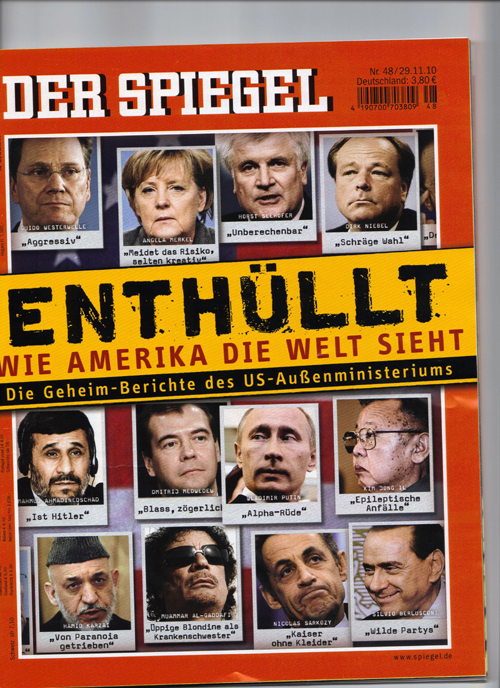
Spiegel's cover
- From the inside articles, scanned by Symor Jenkins (page 1, page 2), we learn that the US have a snitch inside the German government, a member of the liberal FDP party. German chancellor Angela Merkel is described as “rarely creative and risk-averse”. Revelations about the German government go into so much details that Spiegel writes that
“The US is better informed about the secrets of German politics than German politicians themselves.”
[2:27 p.m.] Italy wants to open an investigation on WikiLeaks
According to Spanish daily ABC, which quotes the Corriere della Sera, the Minister of foreign affairs Franco Frattini wants the Italian court to open an investigation on WikiLeaks. Frattini believes the Statelogs are a crime that could seriously damage the international image of Italy. The documents could show damaging information on relations between Italy and Libya, the United States and Russia. Silvio Berlusconi and Vladimir Putin would be particularly targeted.
[1:24 p.m.] Post-2004 period
Several sources (including the Spiegel article posted yesterday and then withdrawn) tend to indicate that the vast majority of the documents concern a period beginning in 2004. The number of dispatches is increasing steadily over the years: 9005 mails are dated and the first two months of 2010. You can read the article in the German newspaper here.
[1:02 p.m.] The New York Times had briefed the White House. In an article entitled “WikiLeaks undresses U.S. diplomacy”, Alain Lallemand, our colleague from Lesoir.be with whom we collaborate on this issue, analyzes the implications of this new dump. He also analyzes the reasons why “The New York Times, partner of Wikileaks, has been briefed last Monday by the White House about the nature of documents that will flee.”
[12:06] StateLogs to expose corruption in Central Asia, Russia (Reuters)
News agency Reuters reveals that the upcoming StateLogs might contain sensitive information about corruption dealings in Russia, Afghanistan and Central Asian Republics. US officials reportedly said that the revelations are “major enough to cause serious embarrassment for foreign governments.”
[11:51] Wikileaks submissions dead? Alternatives exist
Wikileaks’ submission service has been down for several weeks, prompting other solutions to be created for would-be whistleblowers. One of these is German privacy service Privacy Box, which allows for messages to be delivered anonymously. To send us a message securely, use this URL:
[11:42] Official release date might be 22:30 CET
As OWNI informally told AFP yesterday evening, the official launch time might well be 22:30 CET (4:30pm EST), as hinted by the fact that Der Spiegel announces on its home page that the e-edition of the magazine will exceptionally be made available tonight.
[10:39] StateLogs to be “drip fed” over the week
The Telegraph states that the StateLogs will not be published in bulk tonight but will be “drip fed” over the course of the coming week, quoting sources from inside the British government.
[10:30] US refuses talks with Assange
AFP reports that Wikileaks founder Julian Assange wrote to the Department of State on Friday to know who were the persons at risks in the 250,000 documents that might be published today.
US officials answered sternly that:
[They] will not engage in a negotiation regarding the further release or dissemination of illegally obtained US government classified materials
[10:16] Mandela, Gaddafi, Mugabe in the leaks (Daily Mail)
According to the Daily Mail, the StateLogs mention former and current leaders of South Africa, Libya and Zimbabwe. The British newspaper hints at the fact that they are vividly criticized by the American Department of State.
[Sunday 10:09] Der Spiegel’s article has been found
German weekly and Wikileaks partner Der Spiegel published the details of the operation in an article yesterday, before taking it offline. The contents of the article have been found and can be read here (German). See here for an automatically translated version.
[21:30] Larry Sanfer shouts at WikiLeaks. Larry Sanfer, who was once a member of the core Wikipedia team, takes it out on Wikileaks (more in a second tweet)
Speaking as Wikipedia’s co-founder, I consider you enemies of the U.S.–not just the government, but the people. What you’ve been doing to us is breathtakingly irresponsible & can’t be excused with pieties of free speech and openness.
[21:15] Is Obama threatened?
Toby Harnden, The Telegraph correspondent in Washington, wonders if StateLogs will “blow Obama’s nice guy image”. The journalist thinks the release could “seriously damage his foreign policy”, fearing “brutal assessments of Gordon Brown’s personality and cold-eyed judgements of David Cameron’s capabilities.”
[20:45] France criticized
According to The Daily Mail, France might be upset about the release. The tabloid reports a comment of a British official fearing “that mutual American and British contempt for the French would emerge”, tell the Daily Mail.
Moaning about the French was practically a sport
[20:40] Poland warned. According to Polska Agencja Prasowa, the Polish press agency, Poland would have been contacted by the Secretary of State.
[20:30] 85% approve the release. After asking its readers if Wikileaks “should publish sensitive U.S. diplomatic files”, Canadian TV website CBC gives the first results: 84,62% of votants (almots 50 000 votes) approve the release, against 11,54% of negative opinions (6 705 votes).
[20:15] Jeff Jarvis comment. The US journalist wonders “what if diplomacy had to happen in public?“, before he adds “we’ll soon find out.”
[20:00] A Guardian journalist talks. On Twitter, David Leigh, a Guardian journalist, states the imminence of the Statelogs publication:
The truth about the #wikileaks cables is going to come out in the #guardian soon.
[19:30] What is SIPRNET?
Mentioned in Der Spiegel, SIPRNET (Secret Internet Protocol Router Network) allows the employees of US Department of State and Department of Defense to communicate potentially sensitive informations whith each other. This interconnected network protects the confidentiality of this communications until the “secret” level of classification. Global Security also tells that this network is used to convey “SECRET NOFORN” (Secret – Not Releasable to Foreign Nationals) documents.
Since its general implementation in the middle of the 90’s, SIPRNET has become the standard channel to share data.
[18:28] Former ambassadors warn of serious damages
Over at the BBC, John Bolton, the former US Ambassador to the UN, warns of serious consequences of such leaks. In the past, revelation of confidential diplomatic material caused huge problems that took decades to calm down. For him, diplomacy is about handling murky business and no alternative exist.
I’m afraid this is only about discrediting the US. And I’m afraid it’ll succeed.
Clip audio : Le lecteur Adobe Flash (version 9 ou plus) est nécessaire pour la lecture de ce clip audio. Téléchargez la dernière version ici. Vous devez aussi avoir JavaScript activé dans votre navigateur.
[17:34] Less than 600 documents concern France
According to sources close to the project OWNI contacted, less than 600 documents are about France, or .2% of the total dump. Considering Der Spiegel’s map (below), this means that no European country accounts for more than .5% of the total and that the EU as a whole represents less than 5% of all documents. In other words, expect lots of revelations in the Mid-East and Asia.
[17:31] Clinton personally called China
According to reports by Hong-Kong-based television RTHK, Secretary of State Hillary Clinton personally called her Chinese counterpart. This is significant, since none of the other communications that have been reported involved the highest diplomatic figure in America. It might point at severe revelations about US-China relationships.
[16:52] Spiegel gives out the details
German weekly Der Spiegel, a previous Wikileaks partner, announces on its website the details of the upcoming leak (UPDATE 17:50 page is now down).
- 251,287 diplomatic cables will be released.
- 8,000 directives from the State department.
- Wikileaks partners are The New York Time, the Guardian, Le Monde, El Pais and Spiegel.
- 15,652 documents are classified ’secret’
Below is a snippet of the geographic distribution of the logs as seen on spiegel.de at 17:00
[16:25] No ‘top secret’ documents
Politico White House correspondent Mike Allen states on Twitter that:
There’s not a single TOP SECRET document in the wikileaks dump. All are classified at the SECRET level
Secret is the 4th higher gradation on the 5-point secrecy scale. It is defined as material that could “cause “grave damage” to national security if it were publicly available”.
[Saturday 08:25] UK government tries to intimidate newsrooms
Based on an antique piece of legistlation, the British government has sent several DA-Notices (short for Defence Advisory Notice) to newsrooms throughout the country. This is a non-binding procedure that advises editors to consult with the Ministry of Defence before publishing any information. On his blog, Guido Fawkes published the email sent to all media institutions:
May I ask you to seek my advice before publishing or broadcasting any information drawn from these latest Wikileaks’ disclosures which might be covered by the five standing DA Notices. In particular, would you carefully consider information that might be judged to fall within the terms of DA Notice 1 (UK Military Operations, Plans and Capabilities) and DA Notice 5 (UK Intelligence Services and Special Forces).
On his blog, Sky News editor Simon Bucks explains that DA-Notices have almost always been followed, at least by ways of compromise, where journalists make sure to obfuscate some elements.
[22:35] Documents might reveal murky US implications in Turkey
Even before the leaks are published, some media expose the content of some of them. London-based, Arabic-speaking daily al-Hayat talked of several documents involving Turkey. Quoted by the Jerusalem Post, the newspaper states that the Turkish government is unable to control its border with Iraq, letting arms trafficking develop. It also explains the role that Washington plays in the guerrilla led by terrorist group PKK, to which the US have been providing weapons since 1984.
To the East, documents might reveal how Washington sees Moscow officials, giving names. According to South-African website IOL, quoting the Russian daily Kommersant, some documents could show a state of affairs in terms much less diplomatic than usually heard. Discussions between US diplomats and Russian businesspeople could be among the documents.
[21:40] Department of State gets ready
The US Department of Sate has been calling out all governments so that they can get ready for “a worst-case scenario”, said P.J. Crowley, a spokesperson for Hillary Clinton. Several embassies already contacted the governments of the following countries:
- United Kingdom
- Australia
- Canada
- Denmark
- Norway
- Israel
- Russia
- Turkey
- Saudi Arabia
- UAE
- Finland
- Afghanistan
- And France
A spokesperson at the US embassy in Paris explained that the French government too has been contacted but refused to give out details:
The US embassy maintains daily contacts with the Elysee Palace, the Prime Minister and the Foreign Ministry. Many things have been said but I cannot disclose the content of these conversations, for now.
[Friday 21:07] Wikileaks’ website remains unstable
We revealed the information on Nov. 23rd, the organization’s website is unstable and remains so. Our Warlogs application was subject to the same hiccups, so that the host of both platforms, Bahnhof.se, might be to blame. In case of more problems, you can always check out the mirror site.

“Imminent leak”
On November 24, Wired’s Threat Level blog (famous for its uneasy relationship with Julian Assange) and Bloomberg cautiously announced an “imminent release of diplomatic memos”, based on an email sent by Elizabeth Levy, in charge of legislative affairs with the Department of State. She also quotes the New York Times, the Guardian and Der Spiegel as partners.
This new batch should be about the diplomatic cables analyst Bradley Manning might have forwarded to the WikiLeaks team, at the same time as the Collateral Murder video, in which an Apache helicopter opens fire on civilians in Iraq.
A known model
In January, WikiLeaks had already published a single memo concerning the rescue of the Icelandic banks. This lets us imagine the documents’ format:
Click here for a bigger version
Browse the Iraqi warlogs with our interface
Previous articles about Wikileaks
WikiLeaks expanded collaboration with media to ‘maximise exposure’ for Iraq War Logs sources
__
Crédits photo: CC WikiLeaks

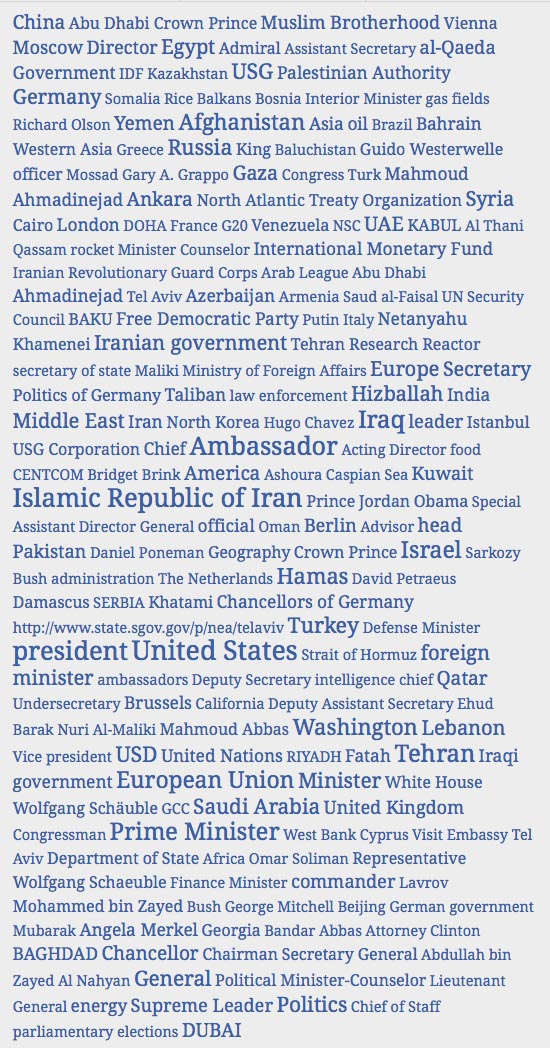
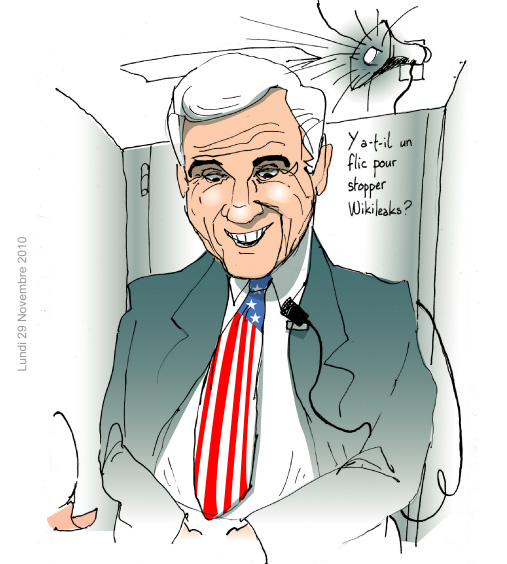
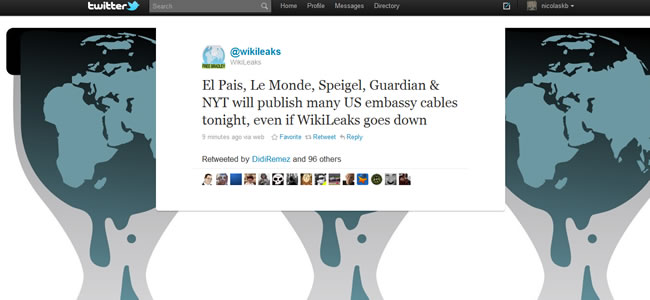
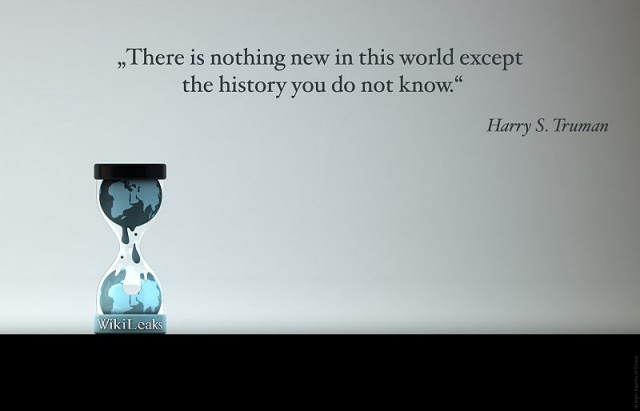
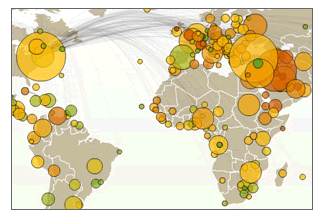
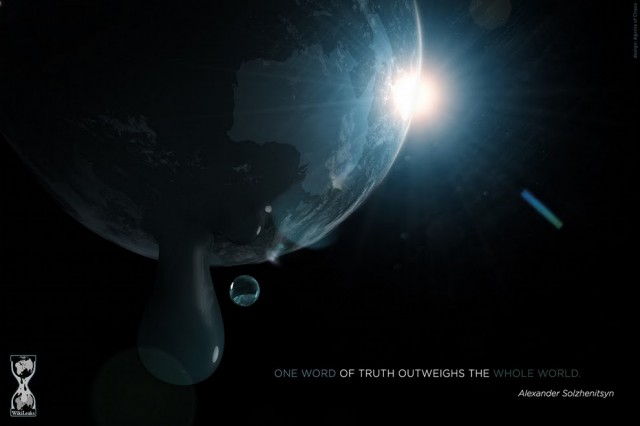
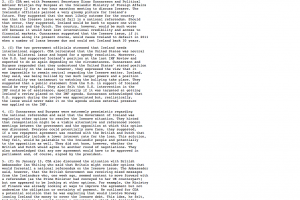
Laisser un commentaire